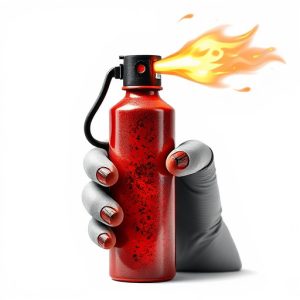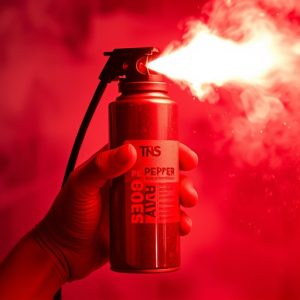Spray Safety Compendium: Chemistry, Storage, and Legal Use of Pepper Spray
Pepper spray is a non-lethal self-defense tool containing capsaicinoid compounds from chili peppers…….
Pepper spray is a non-lethal self-defense tool containing capsaicinoid compounds from chili peppers, specifically oleoresin capsaicin (ORC), which temporarily disables an attacker by causing intense irritation upon contact. Contrary to popular belief, pure pepper spray itself is not flammable; however, formulations that include alcohol or other volatile solvents as carriers can create a flammable aerosol. Therefore, it's essential for users to understand the chemistry and handle these sprays safely, keeping them in cool, dry places away from sunlight, heat, and potential fire hazards. Safety protocols also mandate secure sealing after use, inspection for damage or leaks, and storage beyond children and animal reach. Legal considerations dictate that pepper spray users must comply with jurisdiction-specific laws, including obtaining the right licensing, adhering to quantity restrictions, age limitations, and declaring it at airports due to its hazardous material status. It's crucial to understand that while pepper spray is not naturally flammable, it can become a fire risk in certain conditions, necessitating careful handling and legal compliance to ensure personal and public safety.
Peerless safety precautions are paramount when handling pepper spray, a potent self-defense tool. This article delves into the chemistry of pepper spray that raises its flammability concern, underscoring the importance of safe handling and storage practices to mitigate fire risks. We will navigate the complex legal landscape governing pepper spray use and transportation across different jurisdictions, ensuring readers are well-informed on compliance and safety. Understanding these aspects is crucial for anyone considering pepper spray as a defense mechanism.
Understanding the Chemistry Behind Pepper Spray and Its Flammability
Pepper spray, a commonly used deterrent for personal defense, is formulated with capsaicinoid compounds derived from chili peppers. The primary function of pepper spray is to incapacitate an assailant by causing intense irritation to the eyes, skin, and respiratory system upon contact or inhalation. The chemical agents within pepper spray, particularly oleoresin capsaicin (ORC), induce a rapid and powerful reaction that can lead to temporary blindness and significant discomfort, rendering an attacker incapable of continuing an assault.
Understanding the chemistry behind pepper spray is crucial for its safe and effective use. While the active ingredients are not flammable in their base form, the presence of alcohol or other volatile solvents used as carriers can pose a fire hazard. This is an important distinction: the pepper spray itself, when pure, is not directly flammable. However, the liquid or gel may be combustible if it contains elements that can evaporate and form an aerosol, which, under certain conditions, could ignite. It’s essential to recognize that any flammability risk associated with pepper spray is tied to these solvent components rather than the capsaicinoid compounds themselves. Users should exercise caution and adhere to safety guidelines to prevent accidental fires, ensuring the proper storage and handling of the spray to minimize risks. Understanding this chemistry not only enhances user safety but also informs manufacturers about the necessary precautions in formulating pepper spray products.
Best Practices for Safe Handling and Storage of Pepper Spray to Prevent Fire Hazards
When handling and storing pepper spray, adherence to safety protocols is paramount, especially considering its potential as a flammable substance. To mitigate fire hazards associated with pepper spray, it is crucial to follow best practices. Firstly, always store pepper spray in a cool, dry place, away from direct sunlight and heat sources. This environment minimizes the risk of degradation and potential combustion of the chemical compound. Ensure that the container is tightly sealed after each use to prevent accidental activation and to preserve the integrity of the product.
Moreover, it’s important to keep pepper spray out of reach of children and pets, as unintended discharge can pose significant safety risks. Regularly inspect your pepper spray for any signs of damage or leakage, which could also contribute to a fire hazard. Additionally, familiarize yourself with the manufacturer’s guidelines specific to the brand you are using, as some formulations may have additional storage considerations due to their composition. By implementing these precautions, you can significantly reduce the likelihood of fire hazards and ensure the safe handling and storage of your pepper spray.
Legal Considerations and Regulations Governing the Use and Transportation of Pepper Spray in Various Jurisdictions
In many regions, the use and transportation of pepper spray are subject to strict legal regulations that vary from one jurisdiction to another. These laws are enacted with public safety as a priority, ensuring that individuals can protect themselves without undue risk. When considering the legality of pepper spray, it’s crucial to understand that its classification as a chemical weapon necessitates specific licensing and limitations on quantity. For instance, in some places, pepper spray may be restricted to self-defense products with a maximum concentration of active ingredients. Moreover, individuals must adhere to age restrictions for purchase and use. On a related note, a frequently asked question concerning pepper spray is whether it is flammable. While not inherently combustible, the presence of flammable substances near or during the deployment of pepper spray can create a fire hazard. Users should be aware of their environment and handle the product with caution to prevent such risks. Additionally, transportation regulations often require that pepper spray be declared at airport security due to its status as a potential hazardous material. Compliance with these legal considerations is paramount for personal safety as well as for avoiding legal repercussions. It’s essential to research and understand the specific laws within your locale before purchasing or carrying pepper spray, as failure to comply can lead to fines, confiscation of the product, or even criminal charges.

